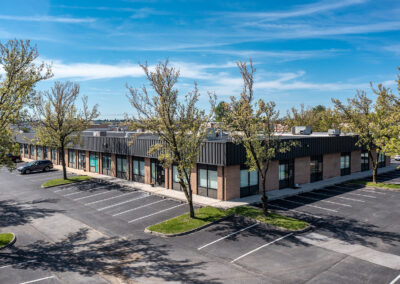by Emily Klingler | 4 min. read


by Emily Klingler | 4 min. read
In the complex world of commercial real estate, professional representation is not merely beneficial—it is essential. As a buyer, access to the right resources and understanding the nature and fluctuations of an active market is paramount to the success of any commercial real estate transaction. And there is no better foundation for that success than choosing the right buyer agent/broker as your advocate.
This is especially true in light of the National Association of Realtors (NAR) recent settlement which restructured the process of negotiating commission fees. Buyers and tenants must now enter representation agreements, or fee agreements, with potential agents/brokers prior to touring, prioritizing the importance of a buyer’s due diligence when choosing representation as well as understanding and negotiating commission fees.
The path to finding a commercial buyer’s agent/broker may be unclear at first, but this blog post will highlight the qualifications and benefits you should expect from a qualified agent/broker and provide insights for choosing a trusted professional for whatever your real estate needs may be.
The nature of an active market is change, and having the power to extract and utilize active inventory and market analytics data in real-time is a major advantage to look for when considering a potential agent/broker. Unlike the residential sector where most of the properties are consolidated and managed within an MLS system, the commercial sector operates between professional networking channels and various listing websites, and involves more in-depth examination of debt, income, analytics, zoning and building codes, and market analysis.
An ideal buyer’s agent should have extensive knowledge and understanding of the local markets, and will be well-versed in pricing trends, available inventory and demographic information. Some firms opt to rely on third-party vendors for their market knowledge, but often these systems focus on major markets while coverage of smaller or more rural markets is relatively less accurate.
Alternatively, ROCK’s in-house data services and research team works daily to cultivate and maintain our Customer Relationship Management (CRM) system which houses available inventory, sale and lease comps, investment opportunities and development projects within the South Central PA region. Having this direct access to the real estate pipeline and real-time market data equips our advisors with fast, reliable information and provides buyers and tenants with access to insights and opportunities not readily available to others.
Commercial brokers undergo specialized training and designations that qualifies them to provide services to buyers, tenants and investors. A broker’s designations and certifications, whether they have experience working exclusively with buyers/tenants, sellers/landlords or all the above, and whether their knowledge is restricted by a specialization such as property type or location are all key factors to establish and consider. Ultimately, the role of a buyer agent/broker is to provide guidance and to streamline the purchase process to save you time and money.
Securing favorable terms in a real estate transaction often comes down to effective negotiation whether residential or commercial. However unlike residential homes, commercial properties are more complex and require many more considerations. To successfully negotiate on your behalf, an ideal agent/broker should be aligned with your goals and exhibit an ability to provide solutions to your unique real estate needs. Look for an agent with a proven track record of successful transactions who is confident and adept in their negotiation skills, and who understands the expectations and motivations of all parties involved in the deal.
Equally important is the discussion of negotiating compensation. Buyers should be prepared to negotiate commission fees and understand the various aspects and services that define them. The representation agreement requirements initiated by NAR’s recent settlement grants buyers and agents this discourse opportunity up front. Inquiring about an agent’s typical fees, possible cooperative compensation options and financing recommendations are all important factors that a well-informed buyer should consider and discuss when deciding on an agent/broker.
Unlike the residential sector, the commercial real estate industry is heavily relationship driven, and an ideal advocate will have a robust network of key personnel and industry contacts including other agents, property managers, lenders, inspectors and other service providers. A well-connected agent will also have access to a wider range of sale and lease comps and off-market properties that may be exclusive, confidential or otherwise unavailable to the public. Combined with professional guidance, these networking resources ensure any buyer or investor has everything they need to succeed in any real estate transaction.
Understanding the business model and professional motivations of a potential commercial agent/broker is another important characteristic for buyers to distinguish when choosing representation. Commercial brokers are business-oriented and should be responsive, accessible, and willing to work closely with you to understand your unique needs and preferences.
At ROCK, our collaborative approach to business philosophy creates positive and enduring business relationships with clients and industry professionals. This relationship-based business model enriches our team’s skills, knowledge and quality of service and provides consumers with capable brokers that are invested in helping them achieve their real estate goals.
Commercial brokers are highly skilled and well-respected professionals who possess specialized knowledge, designations, and experience that are essential in navigating the evolving landscape of commercial real estate transactions, policies and procedures. The recent NAR regulations have not only emphasized the value of a quality broker’s services, but also the importance of a buyer’s due diligence when choosing their representation.
Consumers should understand the significance of the interview process and what to consider when negotiating commission fees. Knowing what to ask and what to expect will help buyers make informed decisions about their representation.
No matter your real estate goals, having a trusted partner is a consumer’s best chance at a successful transaction. Reach out to ROCK today, and let us help you achieve the best solution to your real estate needs.